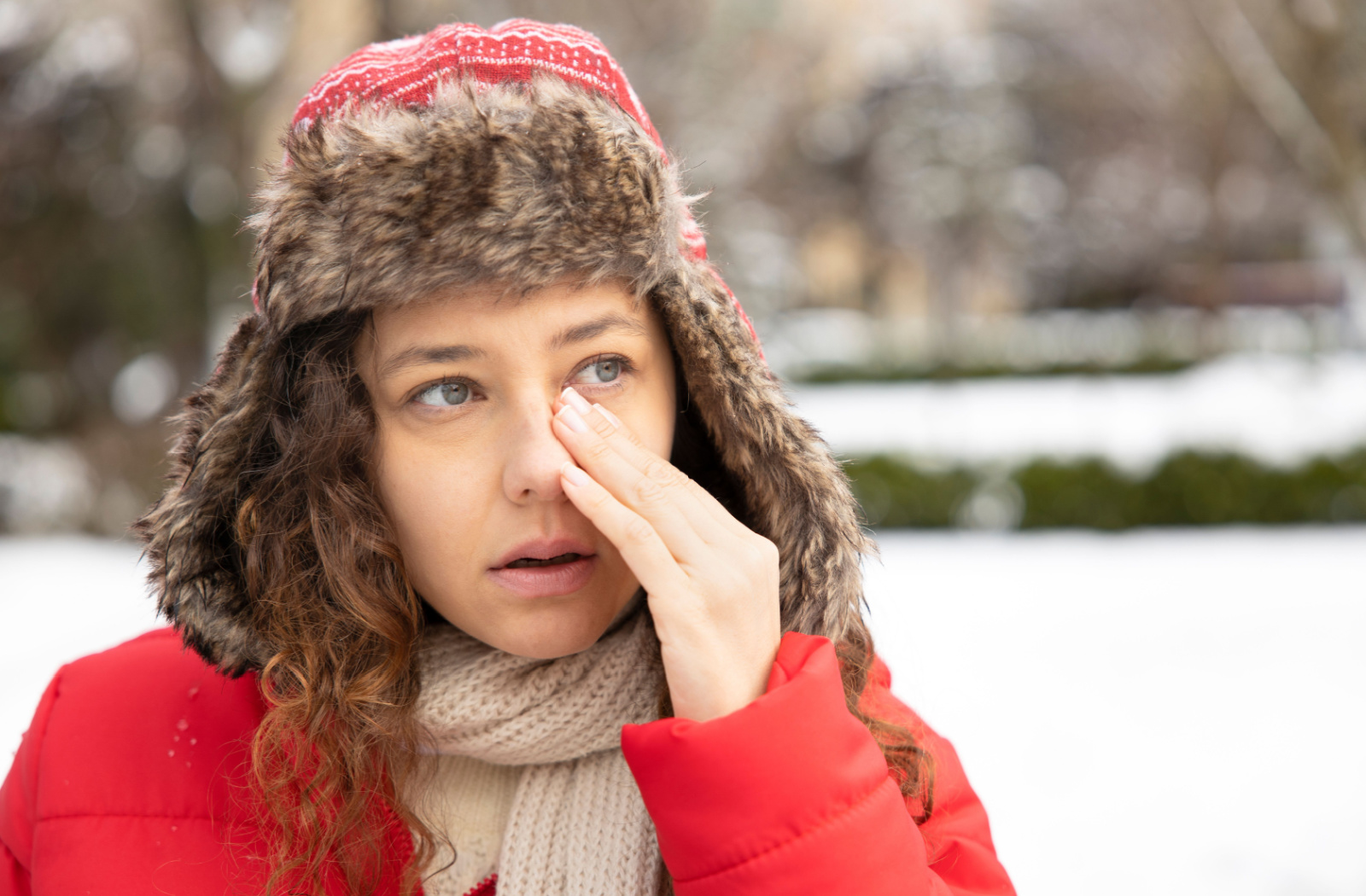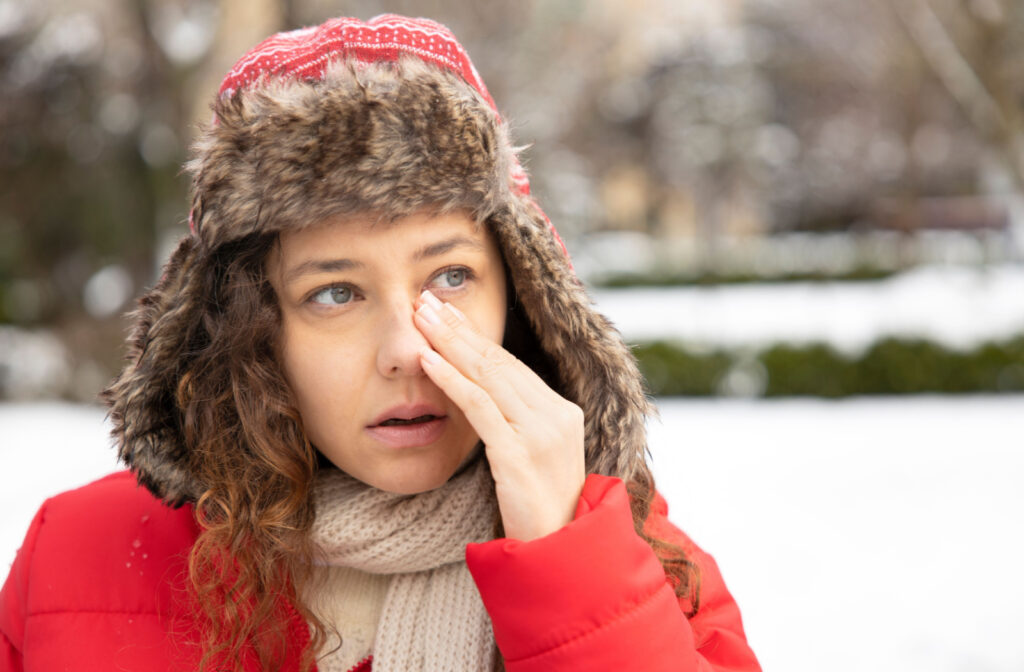Winter is a beautiful season with its chilly breezes and snowflakes falling from the sky. But for some people, winter can also be the season for dry and itchy eyes. The winter air can make your eyes feel dry and uncomfortable, leading to irritation, redness, and itching.
Dry eyes in winter can happen to anyone, but it’s more common in people who wear contact lenses, live in dry homes, or have certain underlying eye conditions. Your optometrist can examine your symptoms and offer treatments that can help you enjoy all winter has to offer.
What Causes Dry Eyes in Winter?
Every time you blink, you’re helping to keep your eyes moist by creating a tear film. This fluid layer nourishes your cornea, the clear front surface of your eye, and helps prevent it from drying out. When your body doesn’t make enough tears or those tears are low-quality and evaporate too fast, you can end up with dry eyes.
While many Canadians experience dry eye from time to time, some factors can increase your risk of chronic dryness, such as:
- Being over 60
- Being female
- Taking medications, such as antihistamines, decongestants, and antidepressants
- Medical conditions, such as rheumatoid arthritis, diabetes, and lupus
- Excessive screen time
- Overwearing of contact lenses
- Dry, windy, and smoky environments
Unfortunately, cold winter months can make some of these environmental conditions worse. During winter, the outside air outside can be colder and drier. Drier air could end up with your tears evaporating too fast. If you wear contact lenses, you may want to consider wearing glasses for a while, as contact lenses can dry your eyes.
We often spend more time inside during winter, but that’s not guaranteed relief either. To keep your home toasty, you’re probably going to turn up the thermostat. A traditional furnace can dehumidify the air inside your house. So, you may be warm, but it could also worsen any already dry eyes.
Not to mention the fact that colds and the flu are more common in winter. Decongestants might help you breathe easier, but those same medicines could reduce your tear production and lead to more dry eyes. All these things together can make winter a difficult season.
Dry Eye Symptoms
Dry eye symptoms can range from mild to severe and significantly impact your daily life. While people may experience dry eyes differently, some of the most common symptoms include:
- A stinging, burning, or gritty sensation
- Red eyes
- Blurriness
- Light sensitivity
- Stringy eye mucus
- Discomfort wearing contact lenses
- Excess watering as your eye increases tear production trying to combat the dryness
Treatments for Dry Eye
Your optometrist can provide comprehensive evaluations and treatment options for dry eyes. They begin with thoroughly reviewing your medical history, diet, habits, and current symptoms. They can examine the health of your tear film and eye glands in order to assess the severity of your condition and also start creating a personalized treatment plan.
Treatment for dry eye focuses on restoring moisture to the eye’s surface and preserving the fluid you already have. Many times this involves unblocking glands to help improve the quality of your tear film.
Dry eyes can have multiple causes, which is all the more reason to have a treatment plan crafted for you.
Artificial Tears
Some dry eye symptoms can be treated with over-the-counter eye drops called artificial tears. The idea is simple, these drops assist your natural tears in lubricating your eyes. You may need to use artificial tears multiple times a day, but if you find you are surpassing the amount suggested on the label, you should see your eye doctor immediately.
People who wear contacts need to take extra care to ensure their drops are compatible with their lenses. Certain artificial tear ingredients could damage the plastic in contact lenses.
Humidifiers
Running your furnace hot in the winter can dry out your air. However, you can combat this dryness by adding a humidifier to the room. Just make sure to keep your humidifier clean, as bacteria can build up inside it which could instead cause further eye irritation.
Warm Compress
If you’re looking for quick relief for dry eye symptoms, a warm compress can be an effective path to relief. And, you can make one at home in only a few minutes with a washcloth or towel!
Follow these steps to make a warm compress:
- Fill a bowl or similar container with warm water.
- Dip a washcloth or towel into the warm water.
- Lift the washcloth out of the water and wring out the water until it doesn’t drip.
- Fold the washcloth until it’s just big enough to cover both eyes.
- Place the compress gently over your eyes, leaving it in place for about 5–10 minutes or until it dries, if sooner.
Your optometrist may also recommend microwavable compresses that can retain heat for longer and distribute more evenly across your eyes.
Unblocking Meibomian Glands
Meibomian gland dysfunction (MGD) causes a majority of dry eye cases. The meibomian glands are crucial for a healthy tear film, but they can become blocked. When this happens, they can’t produce the meibum oil that helps keep your tears from quickly evaporating.
Your optometrist has the tools to dissolve these blockages and get the oil flowing again. Depending on what you need, they may suggest:
- Intense pulsed light (IPL) therapy
- Radiofrequency (RF) therapy
- Heat therapy
- Eyelid debridement/cleaning

Personalized Dry Eye Treatment & Evaluations
At Vision Care Centre, we understand that each patient is unique. Through careful evaluation and assessment, we can create an individualized treatment plan that meets the specific needs of your situation. Our treatment plans are designed to alleviate symptoms, improve the quality of your tears, and protect your long-term eye health.
Our personalized dry eye treatments could:
- Provide quick symptom relief
- Restore normal tear flow
- Enhance eye comfort
- Improve vision quality
- Prevent corneal damage and infection
- Help maintain eye moisture
Dry eye is a complex condition that requires a nuanced approach. Don’t suffer any longer, and book an appointment at Vision Care Centre in Scarborough today! We’re here to help you see the winter season’s beauty the way it was meant to be seen.





